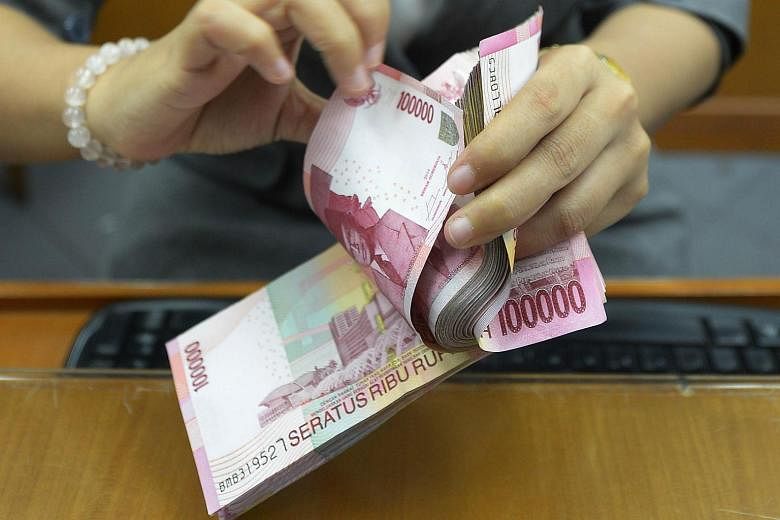SINGAPORE (BLOOMBERG) - Investors selling the rupiah on concern Indonesia will suffer a debt crisis risk a self-fulfilling prophesy.
The rupiah has slumped to its lowest level since the peak of the Asian financial crisis, when Indonesia was bailed out by the International Monetary Fund. Its nine-week decline is the longest since June 2004. That's unfortunate timing for the nation's government, banks and companies that owe a record US$304 billion (S$433.9 billion) in foreign debt, almost three times the country's US$105.4 billion of international reserves, according to central bank data.
Indonesia's currency has plunged 13.2 per cent this year, Asia's worst performing after Malaysia, as China's yuan devaluation in August fueled speculation of currency wars in the region. Bonds denominated in the US currency have lost 3.9 per cent over the last three months, JPMorgan Chase & Co. indexes show, as companies face a vicious cycle of higher debt servicing costs, falling earnings and slumping asset prices. Only Mongolia's debt fared worse in Asia.
"The debt servicing costs of these companies will go up and that means impact on leverage and coverage ratios," said Raymond Chia, the head of credit research for Asia ex-Japan at Schroder Investment Management. "The impact could affect a company's reported bottom line as well as dividends, which may cause their stock to drop. That drop could eventually feed through to the bonds given investor sentiment."
Of the debt, US$169.7 billion is private, according to central bank data. Companies listed in Jakarta reported about US$22 billion of foreign currency debt as at the end of June, 24 per cent more than a year earlier, according to data compiled by Bloomberg. PT Astra International, which assembles and sells cars for Toyota Motor, has the biggest exposure with US$3.5 billion in currencies outside of rupiah, or about two thirds of its total borrowings.
PT Indofood Sukses Makmur, the maker of Indomie instant noodles controlled by billionaire Anthoni Salim, is the second-biggest foreign currency debtor among publicly traded firms with US$1.7 billion of exposure, about three quarters of the money it owes to banks and investors.
It may be premature to declare a crisis. The rupiah's plunge will also make Indonesian products cheaper abroad and favor economic growth in the long run, according to Hal Hill, a professor of Southeast Asian studies at the Australian National University in Sydney.
"Indonesia has not had an asset price bubble which is often a precursor to a crisis," Mr Hill said. "There's also a good deal more caution than in 1998."
The rapid rise of private leverage offshore has left Indonesia at risk. Standard & Poor's says the nation is more exposed to capital flight than neighboring Malaysia.
"The thing about Malaysia is that the capital market is deeper there, so there's less reliance on foreign capital among corporates or banks to fund their growth," said Kyran Curry, S&P's director of sovereign ratings in Singapore. "Indonesia is much more vulnerable to shifts in outflows and inflows. We're worried about Indonesia's foreign-exchange reserves."
Private external dues are now equivalent to 56 percent of the total offshore debt owed by the country. At the end of 1996, the equivalent was even less at 36 per cent, according to Yasuyuki Matsumoto's 2007 book 'Financial Fragility and Instability in Indonesia'.
"The distinctive characteristic of the Indonesian external debt problem during this period was the rapid build-up of the corporate debt," Mr Matsumoto wrote.
Standard & Poor's has downgraded seven Indonesian companies this year and not upgraded any, data compiled by Bloomberg show. The rating cuts included animal feed producer PT Japfa Comfeed Indonesia, tire maker PT Gajah Tunggal and conglomerate PT MNC Investama, with S&P citing foreign currency exposure in all three cases.
"A number of these companies, with the exception of some consumer and shipping companies, managed to pull through the global financial crisis, even if under a stressed situation," Mr Chia at Schroder said.
"This time around, while currency weakness is one aspect to consider, the lower commodity price is a key factor too."

